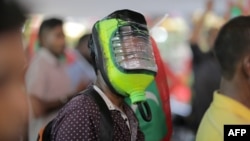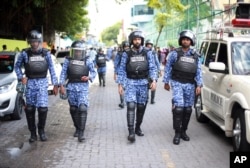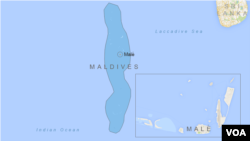Seventeen Maldivian journalists arrested during a protest the previous day were summoned to give statements on Monday evening.
“We don’t know if we will be formally charged yet,” said Zaheena Rasheed, editor of the Maldives Independent.
The journalists, however, are bracing for the worst, considering how democratic gains in the Maldives have eroded in recent years, including a crackdown on the press.
Police in Male on Sunday unleashed pepper spray on dozens of demonstrators, which included journalists and activists, protesting the government’s move to criminalize defamation and other actions recently taken against the media.
A statement issued by police says officers moved to break up the demonstration with “minimum force” after it moved into a protected zone near the presidential office and some people scaled barricades.
Rasheed denies the police version of events, saying the protestors had already been pushed back by authorities from the protected zone before they were arrested.
"By this time many journalists had been targeted and pepper-sprayed at close range. I got up to leave because I saw many members of my team getting arrested. And then the police official said I would not be able to go back, I'd have to get in the police van,” she told VOA.
Maldivian media outlets and their journalists have been facing a variety of threats.
“Media offices have been attacked and there's been numerous death threats against journalists, both over text messages and also in person, as well as assaults,” said Rasheed. “There's been no justice for any attack on journalists and media offices."
Oldest newspaper closed
The South Asian archipelago nation’s oldest newspaper, Haveeru, — which is also the most popular online news site in the Maldives — was effectively forced closed for an indefinite period by a court order last week, throwing 70 staff members out of work.
“From Thursday we stopped our print edition and on Saturday online [also was halted],” said Abdulla Jameel Ahmed, the assistant editor of the Haveeru Daily.
“We can’t use our name or logo anywhere,” Jameel told VOA.
The ruling party of President Yameen Abdul Gayoom has put forward legislation that would inflict fines of up to $324,000 on those convicted of defamation. Those who fail to pay the penalty would be jailed for one year.
Newspapers and websites which publish defamatory content could face revocation of their licenses.
“Legislation criminalizing defamation is one of the most commonly used tools by dictators and autocrats around the world to silence dissent and to suppress free speech,” member of parliament Eva Abdullah of the opposition Maldivian Democratic Party told VOA. “President Yameen is confirming his place among the world’s autocrats.”
The draft law also says the constitutional right to freedom of speech can be narrowed or restricted if an expression contradicts a tenet of Islam, threatens national security, defames or causes damage to an individual, or violates societal norms.
“This move by the government is aimed at silencing critics and weakening the country’s already fragile media,” said the International Federation of Journalists.
Missing journalist
Reporters also took to the streets in Male Sunday to protest against some media organizations being barred from covering court cases and to pressure authorities to fully investigate the two-year old case of a missing journalist, Ahmed Rilwan, a colleague of Rasheed’s.
“It's been 600 days since he's been disappeared,” notes Rasheed.
Police on Sunday said Rilwan had been abducted at knifepoint by a criminal gang.
Home Minister Umar Naseer last November said that former Vice President Ahmed Adeeb, detained two months previously on suspicion of links to an explosion on the president’s speedboat, had been
questioned over Rilwan’s disappearance.
The U.S. Ambassador to Sri Lanka and the Maldives, Atul Keshap, met on Monday with some of the journalists arrested the previous day.
"He expressed his concern over the arrests. And we're very grateful to have support from the international community right now,” said Rasheed.
Ambassador Keshap’s visit to the Maldives was “planned in advance and routine,” an embassy official in Colombo told VOA on the condition he not be named.
The U.S. ambassador, accompanied by deputy assistant secretary for South and Central Asian affairs Manpreet Singh Anand, on Monday also “paid a courtesy call” on President Yameen, according to media release from the president’s office, which said the two sides “held discussions about the strengthening of ties between the Maldives and America.”
U.S. and Maldivian officials gave no public indication that the journalists’ arrests were discussed.


